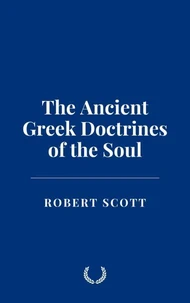The Idea of Afterlife in Ancient Religion and Philosophy
Par :Formats :
Disponible dans votre compte client Decitre ou Furet du Nord dès validation de votre commande. Le format ePub est :
- Compatible avec une lecture sur My Vivlio (smartphone, tablette, ordinateur)
- Compatible avec une lecture sur liseuses Vivlio
- Pour les liseuses autres que Vivlio, vous devez utiliser le logiciel Adobe Digital Edition. Non compatible avec la lecture sur les liseuses Kindle, Remarkable et Sony
 , qui est-ce ?
, qui est-ce ?Notre partenaire de plateforme de lecture numérique où vous retrouverez l'ensemble de vos ebooks gratuitement
Pour en savoir plus sur nos ebooks, consultez notre aide en ligne ici
- FormatePub
- ISBN8230038009
- EAN9798230038009
- Date de parution07/02/2025
- Protection num.pas de protection
- Infos supplémentairesepub
- ÉditeurIndependently Published
Résumé
This book explores the concept of the afterlife across a vast spectrum of ancient and modern belief systems, tracing the evolution of human thought on death, resurrection, and the fate of the soul. Beginning with the earliest known religious traditions, the book delves into the afterlife beliefs of ancient civilizations such as Mesopotamia, Egypt, Greece, and Rome, examining how these cultures understood death and what they believed awaited the soul in the afterlife.
It examines the development of eschatological thought in ancient religions like Zoroastrianism, Judaism, Hinduism, and Buddhism, each offering distinct perspectives on the soul's journey after death. The work also covers the afterlife in early Christianity, analyzing how Christian theology shaped and was shaped by ancient Jewish ideas, Greek philosophy, and mystery religions. The evolution of Christian eschatology, including the development of heaven, hell, purgatory, and the concept of divine judgment, is discussed in depth, with particular attention to influential figures like Augustine and Thomas Aquinas.
It examines the development of eschatological thought in ancient religions like Zoroastrianism, Judaism, Hinduism, and Buddhism, each offering distinct perspectives on the soul's journey after death. The work also covers the afterlife in early Christianity, analyzing how Christian theology shaped and was shaped by ancient Jewish ideas, Greek philosophy, and mystery religions. The evolution of Christian eschatology, including the development of heaven, hell, purgatory, and the concept of divine judgment, is discussed in depth, with particular attention to influential figures like Augustine and Thomas Aquinas.
This book explores the concept of the afterlife across a vast spectrum of ancient and modern belief systems, tracing the evolution of human thought on death, resurrection, and the fate of the soul. Beginning with the earliest known religious traditions, the book delves into the afterlife beliefs of ancient civilizations such as Mesopotamia, Egypt, Greece, and Rome, examining how these cultures understood death and what they believed awaited the soul in the afterlife.
It examines the development of eschatological thought in ancient religions like Zoroastrianism, Judaism, Hinduism, and Buddhism, each offering distinct perspectives on the soul's journey after death. The work also covers the afterlife in early Christianity, analyzing how Christian theology shaped and was shaped by ancient Jewish ideas, Greek philosophy, and mystery religions. The evolution of Christian eschatology, including the development of heaven, hell, purgatory, and the concept of divine judgment, is discussed in depth, with particular attention to influential figures like Augustine and Thomas Aquinas.
It examines the development of eschatological thought in ancient religions like Zoroastrianism, Judaism, Hinduism, and Buddhism, each offering distinct perspectives on the soul's journey after death. The work also covers the afterlife in early Christianity, analyzing how Christian theology shaped and was shaped by ancient Jewish ideas, Greek philosophy, and mystery religions. The evolution of Christian eschatology, including the development of heaven, hell, purgatory, and the concept of divine judgment, is discussed in depth, with particular attention to influential figures like Augustine and Thomas Aquinas.

















